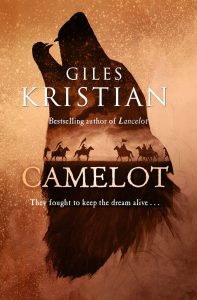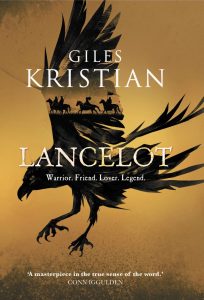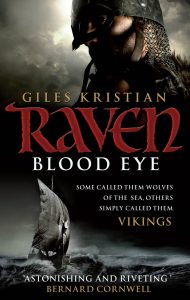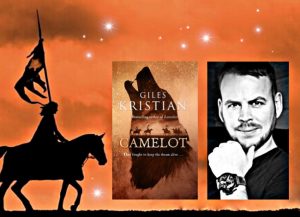Interview with Giles Kristian (CAMELOT)
Giles Kristian’s first historical novels were the acclaimed and bestselling RAVEN Viking trilogy – Blood Eye, Sons of Thunder and Odin’s Wolves. For his next series, he drew on a long-held fascination with the English Civil War to chart the fortunes of a family divided by this brutal conflict in The Bleeding Land and Brothers’ Fury. Giles also co-wrote Wilbur Smith’s No.1 bestseller, Golden Lion. In God of Vengeance (a TIMES Book of the Year), Winter’s Fire, and the Historical Writers’ Association Gold Crown shortlisted Wings of the Storm, he returned to the world of the Vikings to tell the story of Sigurd and his celebrated fictional fellowship. Giles’s new novel, Lancelot, was published to great acclaim and hit The Times bestseller charts at No. 3. It was also a Sunday Times bestseller
Thank you Giles for joining us on The Fantasy Hive!
Firstly congratulations on your release of Camelot! So, could you tell us a bit about your novel? What can readers expect?
Ten years have passed since the great battle which ended Lancelot. Britain is a land of brutality, anarchy, murder and bitter division. The Saxons are strong again, their warbands roaming to kill, steal and burn.
 The heroes of Arthur’s time are gone or scattered far and wide, and the kings of the land will not unite as once they did for a glorious moment to halt the Saxon advance. There is no one to stand against the encroaching darkness. And yet, there are still some who cling to a dream of Britain and the old gods. Camelot tells the story of Lancelot’s son Galahad, who since being abandoned on that fateful day ten years previously has been brought up amongst the brothers of an island monastery in the Avalon marshes. Galahad is a young man burdened by his father’s legacy and embittered by his abandonment. But, in the company of Gawain and a handful of Arthur’s old horse lords, Galahad learns what it means to be part of a brotherhood of a different kind. One which will show him what he can be. And in the fierce and wild Iselle, he finds something worth fighting for. Camelot is a story about legacy, and about how a young man may step out of his father’s shadow to take his own path, whilst at the same time accepting who and what he is. And it is a story of hope, about clinging to a long-faded dream through the darkest of times.
The heroes of Arthur’s time are gone or scattered far and wide, and the kings of the land will not unite as once they did for a glorious moment to halt the Saxon advance. There is no one to stand against the encroaching darkness. And yet, there are still some who cling to a dream of Britain and the old gods. Camelot tells the story of Lancelot’s son Galahad, who since being abandoned on that fateful day ten years previously has been brought up amongst the brothers of an island monastery in the Avalon marshes. Galahad is a young man burdened by his father’s legacy and embittered by his abandonment. But, in the company of Gawain and a handful of Arthur’s old horse lords, Galahad learns what it means to be part of a brotherhood of a different kind. One which will show him what he can be. And in the fierce and wild Iselle, he finds something worth fighting for. Camelot is a story about legacy, and about how a young man may step out of his father’s shadow to take his own path, whilst at the same time accepting who and what he is. And it is a story of hope, about clinging to a long-faded dream through the darkest of times.
You’ve written a fair few books now. Which have been your favourite characters to write and why?
Yes, Camelot will be my eleventh novel, so I’ve spent a lot of time with my characters. The character of Lancelot himself has probably been my deepest submersion. Because of the circumstances around writing that novel, I found myself pulling my heart out of my chest to portray him. It was painful and beautiful. Galahad in Camelot was a different experience, largely because Galahad is a very different man from his father, Lancelot, and I had to really try to find out who he is. I found myself asking, how free is a person to make their own choices, to take their own path, and how much is almost preordained because of who you are and the long shadow in which you walk? But in terms of which characters have been the most enjoyable to write, I’d say that Gawain, particularly in Camelot, is one. His reluctant affection, his frustrations and his sarcastic responses were almost palpable to me. In some ways he’s practical and down to earth, yet he believes in the cause, in the dream as much, if not more, than anyone.
For others I’ve loved writing, we can go back to my Viking novels. Characters like Bram Bear and Svein the Red were such fun because of their humour and general bawdiness. Olaf is a favourite because of his wisdom and insults, and his no-nonsense approach to life. Black Floki was wonderful because he just doesn’t care, and you never know what he’s going to do next. Plus, he’s probably a psychopath. Of them all, though, it has to be Sigurd. Love writing him! He has a charisma that makes me want to hang out with him.
One of the aspects I’ve loved about both Lancelot and Camelot is the way you not only balance in-depth characterisation against a Britain ravaged by warfare, but also the rural beauty found in the land too. Could you explain a bit about your world-building and writing process please? What sparks your imagination?
Thank you! I’m usually writing about long-ago times about which we know relatively little. The story will only work, the reader will only buy into it, if they feel that the world I’ve created is familiar enough to understand and to be able to picture it, yet different and strange enough to want to explore it. I like to describe the flora and fauna for four reasons I can think of right now:
- It helps the reader paint the fullest picture in their mind, enabling them to visualise the scene.
- I feel that plants and herbs and their medicinal uses, animals and their behaviour, signs in the landscape and the natural world, would have been much more familiar to our ancestors. The peoples of the past would’ve had intimate knowledge of the natural world because their lives, and their livelihoods, depended on it, and their myths were full of it. And if they would notice such things, then I want my reader to notice them too.
- Because there’s beauty to be found in a questing bramble or a blanket of wood anemone on a forest floor. These things take on a symbolism which resonates in the scene or with a particular character. I don’t throw anything away. Everything is considered. If I’ve mentioned a particular herb or wildflower, tree or creature, there’s most likely a deeper reason.
- I get the biggest buzz when the writing sings in my head. Writing about the beauty and wildness, the soaring hawk or the raging storm, is all part of the lyrical joy.
Animals tend to play a key role in your books. Which are some of your favourite?
 In Lancelot and Camelot, I knew I was pushing things a little in those scenes where we are seeing things through the eyes of animals which have been ‘possessed’, for want of a better word, by Merlin (Lancelot) and Guinevere (Camelot). They’re quite poetic and a bit…out there. They should’ve been some of the most difficult scenes to write. After all, how does one decide what inner vocabulary, what thought process, to give to, for example, a boar being temporarily inhabited by the mind of a druid? How much to personify and how far to delve into shamanism and the transcendental? In short, I think I was asking a lot of the reader to buy into the whole idea of spirit-journeying. However, along with comprising the sort of earthy magic associated with these myths, I found that it gave me a way of showing scenes from another point of view, which of course is usually impossible in a first-person narrative like Lancelot and Camelot. As it happened, these scenes were some of the quickest to write. I found it liberating and fascinating trying to bond in a spiritual sense with each creature. It was almost a stream of consciousness thing, which very rarely happens with me. On a more practical level, it was fun, if challenging, to write about Lancelot’s sparhawk (sparrowhawk) and their relationship in such a way that each revealed things about the other. You’re right, animals do feature a lot in my books. Perhaps animals teach us about ourselves, or in this case, teach us about our story’s protagonists? I do seem to end up writing about horses a lot. In my Civil War books, The Bleeding Land and Brothers’ Fury, the horses Hector and Achilles were characters in their own right. It was heartbreaking when one of them died. In Lancelot, Tormaigh was a hell of a horse and a loyal friend.
In Lancelot and Camelot, I knew I was pushing things a little in those scenes where we are seeing things through the eyes of animals which have been ‘possessed’, for want of a better word, by Merlin (Lancelot) and Guinevere (Camelot). They’re quite poetic and a bit…out there. They should’ve been some of the most difficult scenes to write. After all, how does one decide what inner vocabulary, what thought process, to give to, for example, a boar being temporarily inhabited by the mind of a druid? How much to personify and how far to delve into shamanism and the transcendental? In short, I think I was asking a lot of the reader to buy into the whole idea of spirit-journeying. However, along with comprising the sort of earthy magic associated with these myths, I found that it gave me a way of showing scenes from another point of view, which of course is usually impossible in a first-person narrative like Lancelot and Camelot. As it happened, these scenes were some of the quickest to write. I found it liberating and fascinating trying to bond in a spiritual sense with each creature. It was almost a stream of consciousness thing, which very rarely happens with me. On a more practical level, it was fun, if challenging, to write about Lancelot’s sparhawk (sparrowhawk) and their relationship in such a way that each revealed things about the other. You’re right, animals do feature a lot in my books. Perhaps animals teach us about ourselves, or in this case, teach us about our story’s protagonists? I do seem to end up writing about horses a lot. In my Civil War books, The Bleeding Land and Brothers’ Fury, the horses Hector and Achilles were characters in their own right. It was heartbreaking when one of them died. In Lancelot, Tormaigh was a hell of a horse and a loyal friend.
The battle sequences in Lancelot and Camelot were outstanding, I absolutely cannot wait to see more of these when I read The Rise of Sigurd series. Were they exciting to write and plan out?
I don’t plan the battle sequences; I just write them. The battle at the climax of Wings of the Storm, the third in The Rise of Sigurd series, is the most epic battle I’ve written. (And I’ve written a lot of battles!) I don’t know. I think I’ve always had a feel for it. I think I’ve been there somehow, in other times, other places. In Lancelot and Camelot, the fight scenes are a little more stylized because I felt that worked with the writing style of those books. In the Viking books the violence is just brutal. I don’t hold anything back. When I finished my first book, Raven: Blood Eye, and gave it to my mum to read, her feedback was not exactly what I was expecting. Somewhat shocked by the bloodletting, she told me I was a filthy heathen savage. She was probably right.
Oh no, your poor mum, Giles!
If you could visit any country at any point in history, where/when would you go, and why?
I think it would have to be England in 1066, the year of three battles, when this country’s links with Scandinavia were severed, orienting England towards the Continent and France and changing this land forever. But as a half English, half Norwegian man, would I have been standing in King Harold’s shieldwall on Senlac Hill, spitting down at William the Bastard? Or would I have been standing at the shoulder of the greatest warrior of them all, Harald Hardrada, when he fought to his last breath and fell with his household warriors all around?
What piece of advice have you found the most useful (or even least useful) during the writing process?
I’ve learned that there are no rules. Some writers drift from past tense to present over a few pages. Some change character POV on the same page. Some (even authors whose books I love) use exposition a lot. I hate that. It breaks the spell and I find myself asking, who is telling me all this? Why is the writer being lazy, feeding me this information which should’ve been written into the actual story or better still left out? I always try to stay within my main protagonist’s experience. In other words, if he or she doesn’t know it, then neither does the reader.
I’m always reading that we shouldn’t write prologues but rather get straight on with the story. Yet I’ve written loads of prologues. Some writers drift from third person to first person in the same book. The fact of the matter is that you can do what you want. It either works on the page, or it doesn’t. You just have to make damned sure it does.
We live in a time where a lot of fantasy/historical books are now being adapted. If Lancelot and/or Camelot were to be adapted would you prefer it to be a television series or a film, and who would you ideally cast for the main characters?
The screen option to Lancelot was picked up by a prominent and brilliant movie producer. We’re currently putting together the pieces to adapt it for TV, which I think would be the best medium. A series would give us the proper space and time to see Lancelot’s boyhood inform his adult self.
Ooh this is exciting news, congratulations!
 I’ll have more news on that project as it comes, but I can tell you it’s a convoluted, exciting, frustrating and fascinating process. I think The Bleeding Land series would work well as a TV drama, the Raven series would make a great series, and God of Vengeance could make for an awesome revenge movie. Basically, a Viking western. But I’m biased.
I’ll have more news on that project as it comes, but I can tell you it’s a convoluted, exciting, frustrating and fascinating process. I think The Bleeding Land series would work well as a TV drama, the Raven series would make a great series, and God of Vengeance could make for an awesome revenge movie. Basically, a Viking western. But I’m biased.
And whilst we’re on the subject of adaptations, do you have any favourites?
I think The Last Kingdom TV series has improved vastly with each season. I found some of Season 3 so brilliantly acted and very moving. I enjoyed Season 1 of The Witcher, though I haven’t read the books so can’t speak to the merits of the adaptation. The Lord of the Rings movies were breathtakingly good. Screen adaptations often pale against the books for obvious reasons, but I don’t think it’s necessarily helpful to compare them. They are completely different things designed for a completely different audience.
I completely agree about The Last Kingdom, I’m on season two now and each episode gets better and better!
Tell us about a great book you’ve read recently!
Sadly, I don’t read much. I’m always working on my own stuff, whether it be a book, a screenplay, a pitch or the narrative design for NORSE, the video game I’m making with Norwegian studio Arctic Hazard. I’m currently listening to the audiobook of Wanderers by Chuck Wendig, which I’m enjoying. So far it seems just my type of thing, reminiscent of Stephen King’s The Stand. I love well-written apocalyptic stories with complex characters and heart. So I absolutely loved Justin Cronin’s The Passage Trilogy.
And lastly, can you tell us a little something about your current work(s) in progress?
I can’t talk about what’s next on the book front yet, I’m sorry to say. For now, it’s all about Camelot. In these strange times, when bookshops are shut and people are staying at home, I want to give Camelot the energy it deserves. I hope that it finds its readers out there one way or another, that they can immerse themselves in the story and be transported to a far-off time for a while..
I can gladly say that Camelot is an absolutely incredible read, you can read my review here! So if you’re dying to get your hands on a copy, you can order one here.

